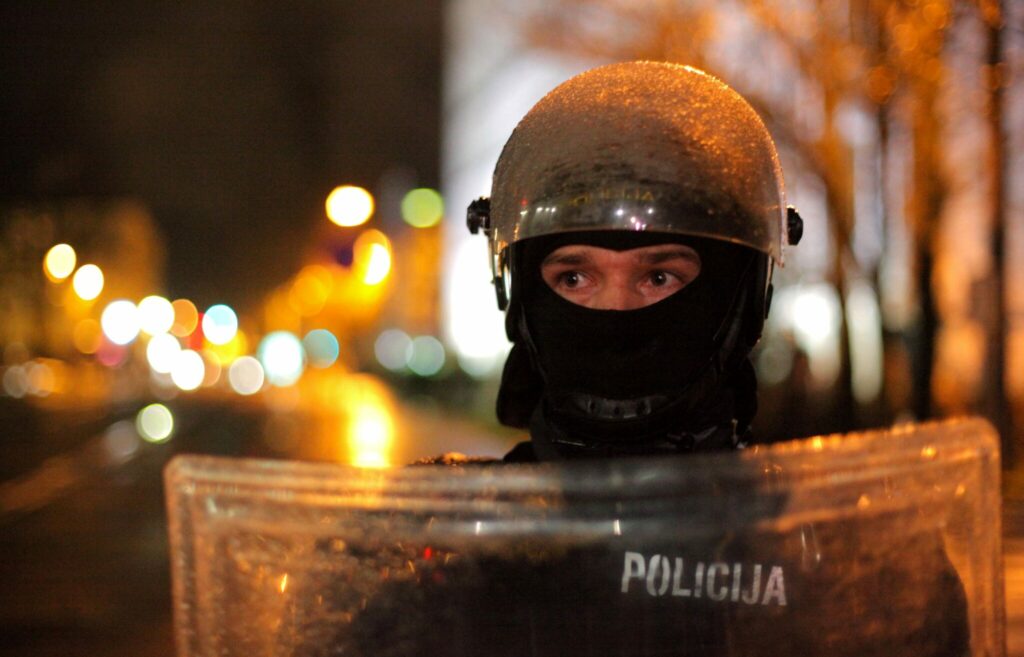The Slovenian capital is facing a drastic increase in crime. According to recent police data, the number of crimes has increased significantly in the areas of all but one police station. Since the police are clearly no longer in control of Ljubljana’s streets, we asked the former Director-General of the Police, Dr Anton Olaj, to comment on the situation. He said that Slovenians are entitled not only to security, but also to a sense of security. He was also critical of the authorities, especially the Minister of the Interior, Boštjan Poklukar. He then warned of the new security risk posed by migrants relocated from Italy to Albania.
The police data is clear. Crime has increased in all but one of Ljubljana’s police stations. In Bežigrad, the number of crimes increased by almost a third. Moste are not much better, recording a 25.3 percent increase, and Šiška recorded a 21.1 percent increase. The crime rate fell only in the centre of the capital, but not by much.
We first asked the former Director-General of the Police what, in his opinion, is the reason for the stark increase in crime. He believes there are several reasons for it, but that the most disturbing thing is the rise in the number of rapes. This crime is associated with immigrants, to which they are particularly sensitive and pay them special attention, in view of what is happening in the world.
“The current open-door migration policy is leading to a concentration of asylum seekers in Ljubljana, where they walk around freely. At certain points, we see they gather in larger numbers and, of course, this leads to situations where the risk of the female population falling victim to these people increases. The situation is similar to other countries in the European Union that are struggling with this. Slovenia is no exception, and this is also what we are facing in the future if we persist with this ill-thought-out migrant policy,” said Dr Olaj.
A new security risk
In addition, Olaj also pointed out a new complication in the international sphere. Italy has announced that migrants who have arrived on its shores via the Mediterranean route will be relocated to Albania to await the resolution of their asylum applications. He explained: “This means that these asylum seekers who will be moved from the Italian coast to Albania will almost certainly try to re-enter Italy via the Balkan migrant route, which runs through Slovenia. This means that the reception of these migrants will be even greater. And so, what has been rumoured for some time now is coming true – namely, that Slovenia will become a sort of migrant pocket. This is now coming to fruition. And it is now clear to everyone, but not to our Minister of the Interior Boštjan Poklukar.” Olaj called on the Slovenian authorities to rethink their approach to migration to Slovenia and for appropriate security solutions to be adopted to reduce these risks.
Illegal migration should be restricted at the border
When asked what these precautions should be, Olaj replied that “the issue is multifaceted.” As he said, there is little point in simply catching illegal migrants within Slovenia itself, as this only results in them getting the transport and care in Ljubljana or Logatec in asylum centres. “I have repeatedly stressed that these efforts should be shifted to the border itself,” he warned, adding that the pragmatic Croatian authorities would also adapt to stricter controls at the Slovenian border. Once they realise that “surveillance at our border has been tightened, they will be willing to do more to make their Schengen border more impenetrable than it currently is.”
In our talk with Dr Olaj, we also touched on the latest media coverage of the police, which shows that most crimes in the capital are still committed by Slovenian citizens. Olaj responded that these are “propaganda approaches”, as this is how the media try to make it seem as if Slovenians are also involved. However, these perpetrators are more or less newcomers with their own culture, who find it difficult to adapt to our traditional Slovenian culture – or what is left of it. “Regardless, all people deserve security. It is our constitutional right. It is also right that we are properly informed if we are hosting rapists in Ljubljana,” he explained. He then added that people have a right to be informed. If not for other reasons, then for the public to be able to react appropriately to a rise in crime, for example, by restricting people from visiting risky areas. However, if crime data is concealed, this can also affect the sense of security, which is “part of the security to which people are entitled”.
What can local authorities do to increase safety?
Finally, we turned to the issue of local authorities. As Dr Olaj said, they could also contribute to making Ljubljana safer. He pointed out that the media are now also reporting that Ljubljana’s streets are no longer safe in the evening. “This suggests that someone else has taken control of the streets, some groups, criminals or whatever you want to call them. The state, through the security authorities, be they policemen or riot police, must have the power on the streets,” he concluded. If they were out there, among the people, there would be a greater sense of security, too.
Žiga Korsika


